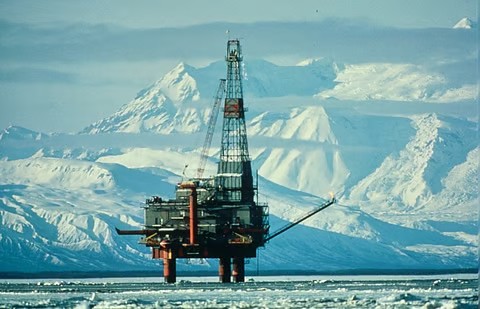President Donald Trump has signed an executive order opening millions of acres of Alaskan wilderness to oil and gas drilling, marking one of the most consequential environmental reversals of his second term. The decision, unveiled during a rally in Anchorage on Monday, reauthorises exploration and extraction across vast portions of the National Petroleum Reserve-Alaska (NPR-A) and revives leases near the Arctic National Wildlife Refuge (ANWR) previously halted under the Biden administration.
Trump framed the move as a critical step in restoring American energy dominance and securing long-term domestic supply. “We are unlocking the full potential of our country’s resources,” he told supporters. “Alaska will lead the way in making the United States energy independent once again.”
The announcement has reignited fierce debate across political, environmental, and industry circles. Conservationists have condemned the policy, warning it could irreversibly damage fragile Arctic ecosystems that are home to polar bears, caribou, and migratory birds. Several Native Alaskan communities, while divided on the issue, have voiced concern over the long-term environmental and cultural costs.
The areas targeted for renewed development span over 10 million acres and include regions that had been placed under heightened protection just two years ago. Under Biden, leases in parts of ANWR had been cancelled and new drilling in the NPR-A was curtailed in favour of climate targets and Indigenous consultations. Trump’s executive order nullifies those restrictions and directs the Department of the Interior to fast-track permitting and infrastructure approvals.
Industry reaction has been broadly positive. Energy companies say the move will stimulate investment, create jobs, and boost tax revenues for Alaska, whose economy has long relied on resource extraction. However, analysts caution that practical challenges remain, including high development costs, uncertain oil prices, and potential legal challenges from environmental groups and tribal coalitions.
Critics of the administration accuse Trump of undermining international climate commitments and prioritising short-term fossil fuel gains over sustainable energy strategy. Democratic lawmakers have vowed to contest the decision in court and in Congress, citing the growing urgency of climate change and the need to protect remaining wildlands.
The drilling expansion comes as the Trump administration doubles down on a broader deregulatory agenda in its second term, seeking to unwind a host of environmental, labour, and financial rules implemented over the previous four years. It also signals a clear intention to reassert fossil fuels at the centre of US energy policy, despite mounting global efforts to shift toward renewables.
The full impact of the decision will depend on how quickly exploration projects proceed and whether the courts uphold the administration’s authority. For now, President Trump has firmly reestablished energy policy as a defining feature of his leadership—and placed Alaska once more at the heart of America’s resource debate.
newshub finance



Recent Comments